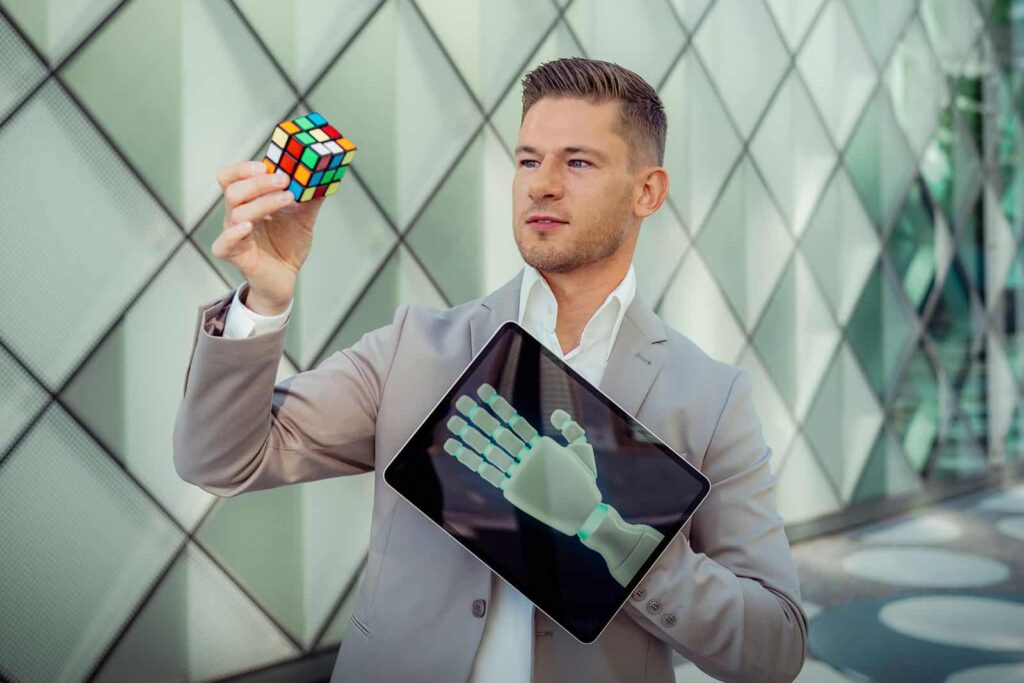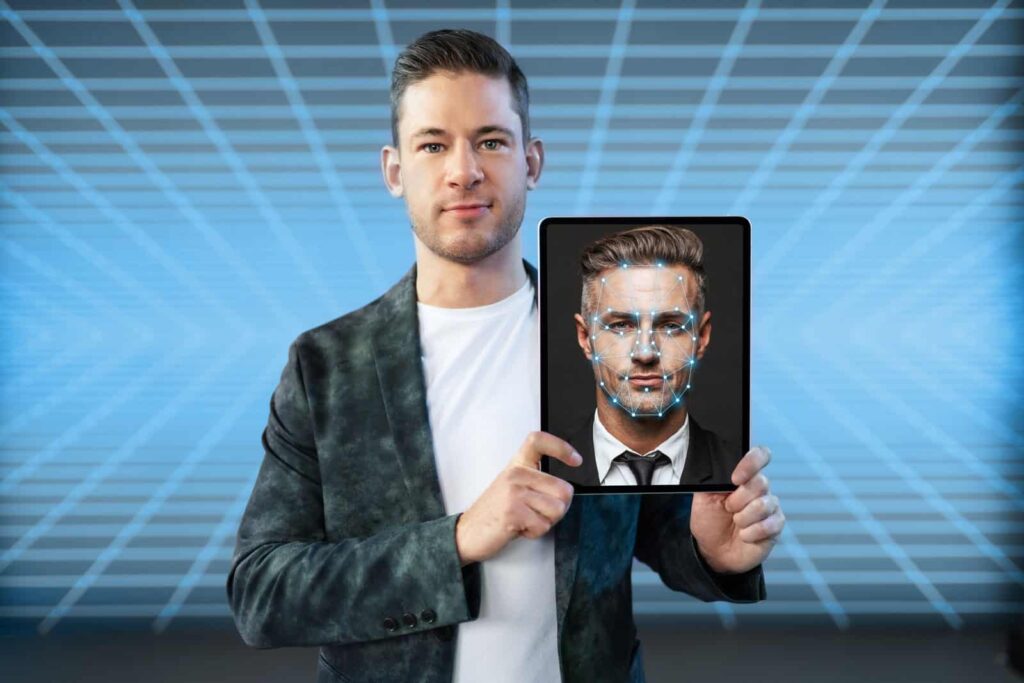Artificial intelligence
Keynote AI
Man and Machine
My show keynote on AI is about the interaction between man and machine. While traditional tools lie dormant until we use them, artificial intelligence is active. It controls processes, analyzes data and takes on tasks that used to take a lot of time. This shifts the focus of work. Away from clicking and towards instructing.
My “somewhat different lecture” on AI shows how our role is changing. AI can write texts, generate images, develop code or evaluate tables, but humans with their judgment, creativity and responsibility remain crucial. In my talk, I explain how companies can use AI sensibly without losing the human factor.
The connection between man and machine opens up new possibilities, from more efficient work processes to creative applications that were previously unthinkable. Those who understand and manage artificial intelligence correctly gain time, quality and freedom for the essentials. Humans and machines achieve more together when their strengths complement each other.


You are currently viewing a placeholder content from YouTube. To access the actual content, click the button below. Please note that doing so will share data with third-party providers.
More InformationExample
Deepfake with AI
Your employee or manager as part of my show
Using only a photo that you send me by e-mail in advance of the presentation, artificial intelligence can use “deepfake” technology to bring an executive from your company to life, for example, and make them do amazingly unusual things! This act is guaranteed to cause laughter, amazement and reflection in my presentation on artificial intelligence.
The integration of the person in the keynote is at the highest level. Above all, it is about the amazing demonstration of artificial intelligence. Photos processed by AI will not be published or passed on to third parties.
Info: You can send me a high-resolution photo of the person in any file format by e-mail. It is important that the face can be seen frontally in portrait format (see example image).

Additional Examples
Here you can find five more presentations from my keynote on artificial intelligence:
Thoughts: AI recognizes patterns where we only see noise, but can it see through us humans?
Climate: Using AI to identify places where too much CO2 is produced and then using creative ideas to make it disappear.
Robots: What tasks do we humans want to reserve for ourselves in the future, and what do we leave to AI?
Creativity: Why, for the foreseeable future, AI will only lead to innovation in combination with human creativity.
Art: Can AI create art and what value does it have for us humans?

My keynote on AI is about the decades-long fascination and fear of humans of a future in which machines and artificial intelligence become part of our bodies. But with smartphones in our pockets, smartwatches on our wrists and permanent digital assistants, this scenario has long been a reality, except that we have not become robot-like beings as a result. On the contrary, my AI keynote shows that advancing technology is not dehumanizing people, but rather making them more aware of what really makes them tick. If artificial intelligence one day not only relieves us of physical labor, but also of thinking, we will be left with what AI will never possess: Empathy, creativity, values and the ability to feel. In my keynote AI, it becomes clear that it is not a question of humans and machines working against each other, but of working together, with technology complementing us, not replacing us. Artificial intelligence can support us, take over monotonous tasks and increase our performance, but it needs guidance, meaning and direction that only humans can provide.
The word “technology” comes from the Greek techne, which means skill. This already contains the message of my keynote on AI: machines and robots are tools, not opponents. They are extensions of our abilities, created to serve us and grow with us. That is why, in my keynote on AI, I advocate allying ourselves with these tools, using them consciously and understanding our own role in a new way. Human intelligence has always developed through self-reflection, through the ability to think beyond ourselves. The phrase “I think, therefore I am” loses its validity in the age of artificial intelligence, because machines will soon be thinking too. But they will not be able to feel, dream or doubt. That’s why we need to understand humanity as a strength and cultivate it, the playful, the irritating, the imaginative, the unpredictable. In the keynote AI, I will show why precisely these human characteristics will be crucial in the future if we want to differentiate ourselves from algorithms.
Artificial intelligence is not only changing work, communication and decision-making processes, it is also changing the way we think and how we see ourselves. My keynote on AI is about shaping this development in a positive and responsible way. We live in a world that has become so complex that it is almost impossible to grasp intuitively. This makes it all the more important to return to the feeling of wonder, that childlike curiosity that is the origin of every innovation. In my keynote AI, I explain that wonder is the ideal breeding ground for creativity because it encourages us to endure ignorance and be inspired by open processes. Amazement leads to curiosity, curiosity leads to knowledge and knowledge creates meaning. Artificial intelligence cannot be amazed because it has no emotions, no experience of surprise, no sense of beauty or meaning. Only humans can surpass themselves by going beyond themselves. That is why, in my keynote on AI, I call for the business world to promote these qualities more strongly again: Wonder, curiosity and playful creativity. These are the qualities that machines can never take away from us.
At the same time, I provide in-depth knowledge about how AI works and the current state of AI research, such as machine learning, neural networks, deep learning and the ethical issues that arise from this, such as responsibility, transparency and data protection. My keynote AI offers insights into practical applications of artificial intelligence, from medicine and finance to art and entertainment, while also highlighting its social implications. With a mix of information, reflection and entertaining examples, it opens our eyes to both opportunities and risks. After all, AI is not just a tool, but a mirror of our time. It challenges us to rethink humanity and this is precisely the message of my lecture on AI: the future does not belong to machines, but to the connection between man and machine, if we shape it with responsibility, creativity and wonder.
Interview
What changes will artificial intelligence bring?
Everything will change, even ourselves! But I don’t think it will happen overnight.
How are we preparing for artificial intelligence?
We Germans should be a bit more pioneers rather than optimizers and not be afraid of new things, which is exactly what I convey in my keynote.
Should we be afraid of AI?
We should have seen it as a great opportunity long ago. However, there are still many areas in which we can catch up.
The biggest opportunity presented by artificial intelligence?
In my keynote, I explain that we still have the chance to help shape how artificial intelligence can bring people closer together, make society fairer, protect the environment better, fight diseases, etc.
How will we live in Germany in 2050?
It would actually be great if we could finally achieve what mankind has always dreamed of: no longer having to do mindless work, but letting machines do it. Of course, our culture has to evolve in time for this to happen.
When does it become too much technology?
From the moment loss of control starts to cause stress. You should always be able to switch off technology. Machines such as robots or artificial intelligence must serve people, not the other way around.
What specific challenges do you see for companies in the age of digitalization and AI?
Many established companies feel too secure. Only those who are constantly changing will survive in the digital future.
Will AI change my life?
It already has, we just don’t always realize it directly. The perception of reality changes reality itself.
What advice do you give companies in your keynote with regard to artificial intelligence?
To be inspired by start-ups that may be somewhat chaotic without established corporate structures, but can try out, discard and experiment quickly and flexibly. No one can predict success in the digital future. The successes of start-ups are often the result of luck or oversight.
What distinguishes humans from machines?
Machines view everything soberly as algorithms. Humans are highly emotional and irrational (and we should still be allowed to be).
Will man and machine merge to a certain extent in the world of work 4.0? Are we becoming more and more like machines?
That would be a bad thing and won’t happen if we see machines as our tools and not as competition. If machines do the work for us, we have more time for being human. Theoretically.
If my modern home suddenly registers everyone who goes in and out – what does AI mean for our privacy and data security?
It doesn’t have to come to that, even if it is already a similar reality in China today. We can still help shape precisely these kinds of issues. But we can shape them, not deny them – progress is coming anyway.
How self-determined can we still decide against digitalization – especially in our private lives?
The ultimate goal should be to remain as self-determined as possible! Technical progress is only progress if it is also social progress. Life is being and not design.
The essence of human beings is to be a subject. Do our activities on the Internet turn us into objects?
Perhaps on the Internet. But it is just one of many tools. We should, of course, defend humanity alongside artificial intelligence. Not man against machine, but man with machine (by the way, that’s the name of my current show).

